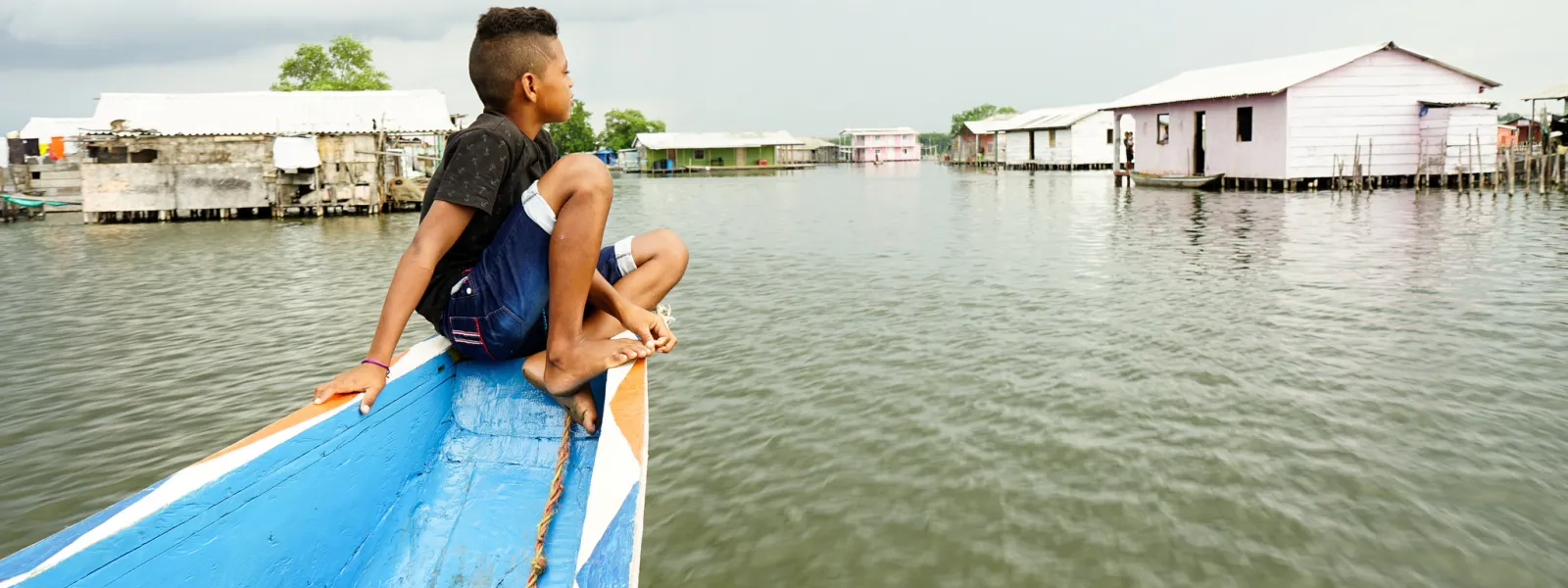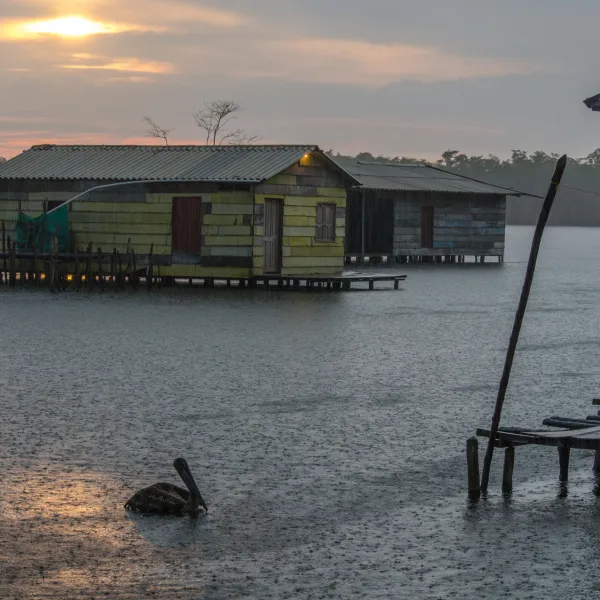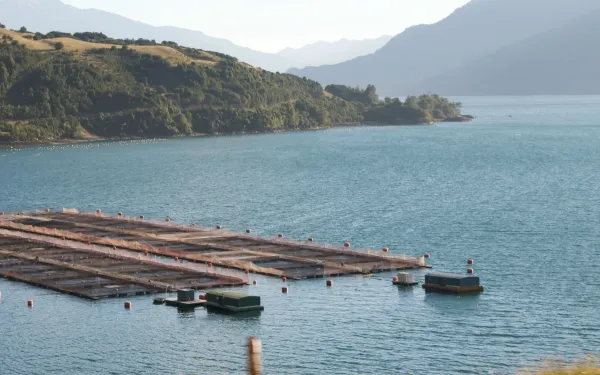
Project
Photo: Anna Laurie Miller / AIDAConserving the Ciénaga Grande de Santa Marta
Ciénaga Grande de Santa Marta, the largest and most productive coastal wetland in Colombia, covers 45,000 hectares. At the confluence of the Magdalena River and the Caribbean Sea, the site boasts an immense variety of flora and fauna, including mammals, birds and fish. Its southern tip is a beautiful sanctuary of mangroves, swamp and amphibious forest.
On the calm waters of the marsh stand the Ciénaga’s famous stilt villages, supported by pillars or simple wooden stakes and inhabited by local fishermen since 1800. In a place accessible only by water, many of the things we take for granted—being served a glass of water, quick access to a doctor—are considered luxuries. Residents depend on the natural world around them. Sadly, in recent years mass fish die-offs caused by the marsh’s degradation have threatened the livelihoods of 2,500 people who call the Ciénaga Grande home.
Illegal activities are destroying this vital ecosystem: intentionally set forest fires, deforestation of large tracks of land for agriculture and livestock, logging and burning of mangroves, and 27 kilometers of illegally built dikes.
This destruction not only devastates the local fishery; it also has global impact. Ciénaga Grande’s mangroves absorb large quantities of carbon dioxide from the atmosphere, aiding in the global fight against climate change.
The importance of the Ciénaga Grande has been recognized both nationally – the Sanctuary of Flora and Fauna Ciénaga Grande de Santa Marta is a national park – and internationally: UNESCO’s Man and the Biosphere program declared the lagoon a biosphere reserve; and the Ciénaga Grande is listed as a Wetland of International Importance under the Ramsar Convention, an intergovernmental treaty for the protection of wetlands.
AIDA and our partners are advocating for the Colombian government to fulfill its national and international obligations to protect the Ciénaga Grande. After all, millions of animals, the local community, and our global climate depend on it.
Partners:

Related projects

Open letter to American States on the signing of a regional environmental treaty
Dear Presidents, On 27 September 2018, countries in Latin America and the Caribbean will have the opportunity to put in place a new instrument to protect the environment: The Regional Agreement on Access to Information, Public Participation and Access to Justice on Environmental Matters in Latin America and the Caribbean (the Escazú Agreement). Your governments can make history and become leaders in environmental protection by signing the agreement during the opening for signature ceremony which will be held in the context of the Annual General Debate of the United Nations General Assembly in New York. The Escazú Agreement is a key tool that will allow for a more participatory approach to decision-making, policymaking and projects relating to the environment and decreasing and mitigating conflicts driven by a lack of effective participation of affected communities. The Agreement delves into the human rights obligations that the countries in the region previously acquired through other international instruments with regard to the right of access to public information; participation in decision-making, including the adoption of inclusive, participatory and representative decisions at all levels; the right to a healthy environment; equal access to justice with regard to environmental rights; and the protection of human and environmental rights defenders, among others. These obligations acquired by the countries of Latin America and the Caribbean, together with the commitments made within the framework of the Sustainable Development Goals and other international agreements, reflect a commitment to environmentally friendly development that respect human rights and future generations. In addition, at the 48th General Assembly of the Organization of American States (OAS) in June this year, your governments welcomed the signing of the Escazú Agreement with the acknowledgment that the human person is the central subject of sustainable development and should be an active participant in this. You also acknowledged that the Agreement is a means to guarantee a safe environment in which individuals, groups and organizations that promote and defend human rights related to the environment can act without facing threats, restrictions, attacks or danger. Signing the Escazú Agreement is the first step required to include environmental access rights into the government agenda. It represents a historic opportunity for your governments to send a clear message to your citizens and the international community regarding your firm commitment to this global agenda for the protection of human rights associated with a healthy and sustainable environment. A global agenda that will benefit everyone in the region and around the world. We call on your governments to sign the Escazú Agreement on 27 September 2018 and submit it to the competent national bodies for its immediate ratification. Now is the time to deliver real steps for real change. Latin America and the Caribbean need you to make the promise of the Escazú Agreement a reality for millions of people in the region. We also urge your governments to adopt rapid and effective measures to implement the provisions of the Agreement.
Read more
Renewing AIDA’s Board of Directors
We proudly welcome the new members of our Board: Xavier Martínez Esponda, Monica Roa and Manuel Pulgar-Vidal. All three are outstanding legal professionals dedicated to the defense of the environment and human rights in Latin America. AIDA’s Board of Directors has been renewed following internal elections, with the incorporation of three new members for the next period of three years. We’re honored to welcome: Xavier Martínez Esponda, a prominent Mexican attorney and Technical Operating Director of the Mexican Center for Environmental Law (CEMDA); Monica Roa, an accomplished Colombian attorney and defender of women’s rights; and Manuel Pulgar-Vidal, a renowned Peruvian environmental attorney, former Minister of Environment of Peru and current leader of the Climate and Energy Practice at WWF International. Manuel Pulgar-Vidal is returning to AIDA’s Board of Directors, which he chaired for eight years after helping to found the organization in 1998. The Board is currently chaired by Manolo Morales of Ecuador, Executive Director of the ECOLEX Management and Environmental Law Corporation. It has as Vice President, Jerónimo Rodríguez of Colombia, Sub-director of Natural Wealth Program at Chemonics International; as Chief Financial Officer, Martin Wagner of the United States, Director of the International Program at Earthjustice; and as Secretary, Margot Venton of Canada, attorney at Ecojustice. Other members include Rafael González of Costa Rica, President of Justice for Nature (JPN) and Pedro Solano of Peru, Executive Director of the Peruvian Society for Environmental Law (SPDA). AIDA is the only regional organization of Latin American experts providing free legal and technical support in defense of the environment and human rights in the Americas. We are constantly seeking new ways to strength the organization, including through the important roles of our Board members.
Read more
Opening our eyes to the dangers of salmon farming in Chile
Recently, I went to dinner with some friends. Two of them ordered salmon. The dish was expensive because, although Chile is the world’s second largest producer, salmon is a non-native species and one of the most popular fish in the country. I respectfully asked my friends if they were aware of the toll commercial salmon production takes on our oceans. Their response was glib: “That’s an exaggeration,” they said. “I don’t think it’s that bad.” Unfortunately, I expected that response. The environmental dangers of salmon farming in Chile are largely hidden, but that doesn’t make them any less serious. An unsustainable industry On July 5, nearly 700,000 salmon escaped from their pens at a farm off of Huar Island in Patagonia’s Los Lagos region. The escape has revived public debate on the dangers of Chile’s salmon industry. Caused by damage the pens sustained during a storm, the escape could represent one of the largest environmental catastrophes since salmon farming began in Chile in the 1980’s. But what’s the bigger problem? As it turns out, it’s not just one problem — it’s many. The problems of salmon farming first became visible in 2007 when scientists recorded the first case of infectious salmon anemia, a lethal illness for the fish. Although the industry adopted new infrastructure and sanitary standards, the root of the problem remained unaddressed—the overpopulation of marine habitats, packed with more fish than they could support, was causing oxygen depletion and, eventually, oceanic dead zones. Those poor farming practices also led to the excessive use of antibiotics to treat illnesses and infections. Eventually, other problems arose—algae blooms, and the so-called red tides that have devastated the area’s marine life. The recent massive salmon escape has posed serious public health risks because the fish had been treated with excessive amounts of antibiotics, making them inapt for consumption by humans or other animals. But, despite warnings from the authorities in the days following the escape, fishermen in the area began capturing salmon and selling them at extremely low prices. As an invasive predator, the salmon also posted a threat to the ecosystem, since they are aggressive fish prone to devastating anything in their path, including native species. Greenpeace said the escape was equivalent to a plague of 140 million rats eating anything in their path. Although the company was required to re-capture at least 10 percent of the salmon, they failed to reach that goal, despite offering up to $11 per fish. The work was further complicated since salmon are prey to sea lions and other predators. All this has revealed a clear structural problem—the lack of government control and regulation of an unsustainable industry. The most recent escape, from a farm owned by Marine Harvest Company, is yet another example of how the entire industry is failing to comply with environmental standards. According to Chile’s National Fish Service, some 3.3 million salmon have escaped from different fisheries in the Los Lagos, Aysén and Magallanes regions in the last eight years. Urgent Measures If this malpractice continues, salmon farming could destroy Chile’s marine biodiversity. Other countries have taken drastic actions in response to cases similar to the one on Huar Island. In the United States, for example, Washington State decided to gradually eliminate salmon farms after 300 salmon escape from a hatchery there. At AIDA, we are working to protect Chilean Patagonia, the country’s most pristine region, into which the salmon industry continues to expand. In May 2017, we filed a complaint with the Chile’s Superintendent of the Environment asking they investigate the damages salmon farms are causing to the Magallanes region, and sanction the companies responsible. We also commissioned a scientific report demonstrating how susceptible the region is to the risks of salmon farming. Hopefully my compatriots will realize that we share a common interest in protecting our most pristine waters from the damages of salmon farming. Because at the end of the day, that bite of salmon may be more expensive than they think.
Read more